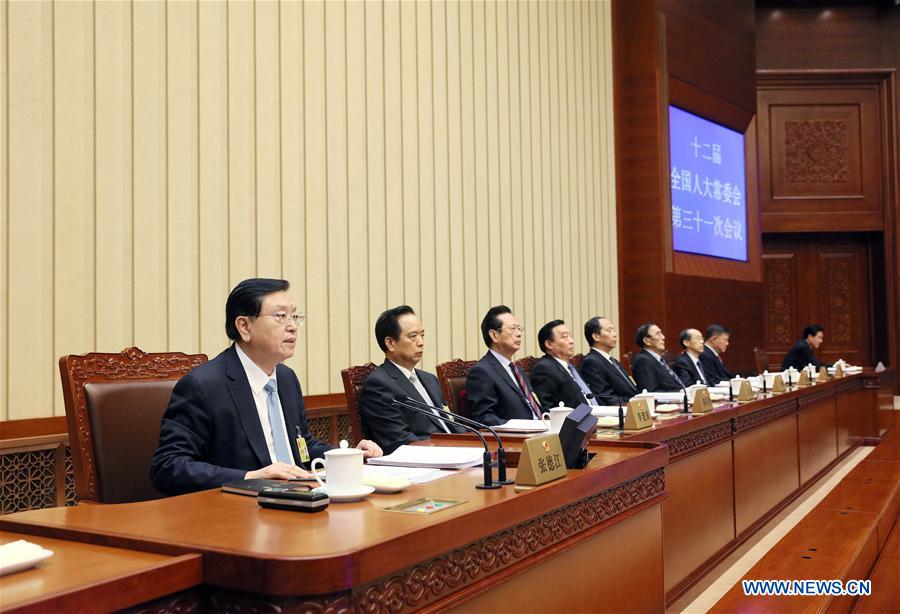China's top legislature closes bimonthly session
 0 Comment(s)
0 Comment(s) Print
Print E-mail Xinhua, December 28, 2017
E-mail Xinhua, December 28, 2017
The Standing Committee of the National People's Congress (NPC) closed its bimonthly session Wednesday, adopting new laws, revisions and decisions on laws and reforms.

Zhang Dejiang, chairman of the NPC Standing Committee, presided over the closing meeting, as well as a meeting attended by the chairman and vice chairpersons beforehand.
Zhang said last Wednesday's annual Central Economic Work Conference laid out a blueprint for the country's economic work in 2018, and lawmakers should do their work in legislation and supervision according to decisions and policies of the conference.
Bills to invigorate rural areas
The top legislature adopted two bills, including a revision to the Law on Farmers' Specialized Cooperatives and a decision to extend a pilot program allowing farmers in selected areas to mortgage their land use rights and housing property rights, amid efforts to invigorate rural areas.
The revision to the Law on Farmers' Specialized Cooperatives grants farmers' specialized cooperatives equal legal status with other market entities, as well as rights to invest in enterprises in accordance with the law.
Approved in December 2015, the pilot program for mortgaging contracted land use rights tried out in 232 localities including Daxing District of Beijing, and that for mortgaging rural property rights was tested in 59 localities including Jixian County in Tianjin.
Wednesday's decision means the pilot program, scheduled to expire on Dec. 31, 2017, will be extended for one year until Dec. 31, 2018.
The pilot program over the past two years has achieved strong results, with improvement in rural financial services and higher incomes for farmers.
One-stop boundary control arrangement in HKSAR
The top legislature adopted a decision to apply a one-stop boundary control cooperation arrangement in the Hong Kong Special Administrative Region (HKSAR).
In the decision, the NPC Standing Committee confirmed that the cooperation arrangement, signed by Guangdong Province and the HKSAR on Nov. 18, complied with the Constitution of China and the Basic Law of HKSAR.
The decision said that the HKSAR should ensure implementation of the cooperation arrangement through legislation.
Under the arrangement, a port will be established at the railway station in West Kowloon in Hong Kong, which is part of the Guangzhou-Shenzhen-Hong Kong Express Rail Link.
New supervision law slated for future deliberation
China's draft supervision law, which was given a second review at the session, will be submitted to the NPC for third reading next year.
The draft, which was submitted to the top legislature for its first reading in June, makes clear regulations on the national supervision system, ways to form supervisory organs, responsibilities and powers, and means of investigation to ensure such organs act in accordance with law.
Also on Wednesday, the top legislature adopted new laws on tobacco leaf tax and ship tonnage tax, which will take effect on July 1 next year in a bid to make the country's taxation more law based.
Both laws were enacted based on provisional regulations promulgated by the State Council in 2006 and 2011.
Lawmakers also adopted minor changes to the laws on tendering and bidding and metrology mainly to cut red tape.






Go to Forum >>0 Comment(s)